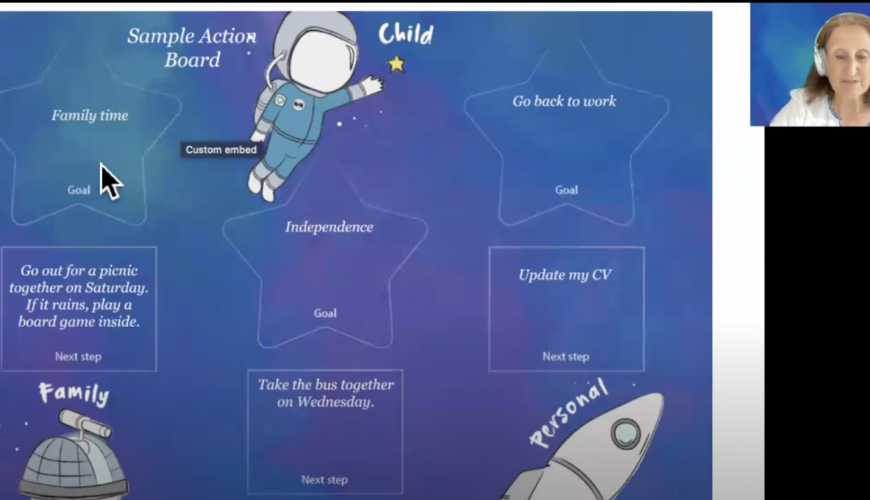Transforming support for families raising children

Organisation: Plumtree Learning
Transforming support for families raising children with disabilities and developmental delays: Australia and New Zealand
Making it easier for families from remote and international sites to access support - 27 January 2022
Overview
In response to the pandemic, Plumtree Learning transformed its services to ensure that families raising children with disabilities and developmental delays continued to access support. The pivot to digital made it easier for families from remote and international sites to access support, minimised disruption to goal planning, and supported decision-making.
Key benefits and outcomes
- Enabled families to access important resources and drive goal planning from their homes during lockdowns.
- Made it easier for families from remote and international sites to access support.
- Up to 96 per cent of families were supported to achieve the goals they set, with outcomes of the online programme comparable to the programme when delivered face to face.
The challenge
Plumtree Learning is an organisation founded and run by parents raising children with special needs. It aims to build family capacity through participation, by running evidence-based programmes to increase families' empowerment, hope, agency and wellbeing. Its programmes were traditionally delivered in person, however COVID-19 and related lockdowns meant that delivering existing face-to-face support was no longer possible. The decision was taken to move the programme to an online format.
The solution
Plumtree Learning first trialled an online implementation process where parents could participate in Pictability – an evidence-based, visual goal-setting tool rooted in gamification – sessions via Zoom. This meant that resources for the sessions had to be posted to participants, which was time consuming and open to postal delays.
A project team was set up to scope further innovation using a project management approach, which explored the best platform to use, how to accommodate international families, how to make sure a co-production approach was taken, and to evaluate the outcomes of the programme.
Trained peer workers co-designed and facilitated the online programmes. These peer workers are also participant-observers and collect data in real time during programmes. Participants were given templates in which to summarise their goals and plans, and these templates were refined as the programme developed.
The programme supports families to identify goals they would like to achieve and provides families with an effective accessible decision-support mechanism, and an opportunity to build agency as they identify, discuss and prioritise the goals to achieve their vision.
Results and benefits
It provided an online platform to enable families to continue to access important resources and get involved in their goal planning from their homes. It also made it easier for families from remote and international sites to access support. A pilot of the E-Pictability version with a group of ten families and professionals, established that its outcomes compare to the benchmark.
Between 85-96 per cent of families who engaged with the online programme achieved their child, family and personal goals. The process is based on images, not words, making it more accessible to those who have English as their second language.
An added benefit was the supported decision-making aspect of this programme. The professionals involved were able to use a new and powerful way to formulate goals with families while building unprecedented rapport in a strength-based and time-efficient way.
Overcoming obstacles
It was a challenge to understand what would work best online and how we would be able to gather participant responses. To gain understanding, Plumtree Learning conducted surveys and asked past participants for their feedback. To increase awareness of the programme to professionals, Plumtree completed an Pictability e-newsletter targeted at health professionals.
Plumtree Learning assembled a list of potential funding bodies to guide applications to support development of the online platform. Translating the gamification aspect of Pictability online was challenging and required funding.
Future proofing
To sustain and grow the programme, Plumtree Learning need to obtain funding to:
- continue researching and building evidence on the use and impact of the E-Pictability online platform
- create new training programs for facilitators to work with E-Pictability with families
- continue adding specialised technological capabilities to E-Pictability, thus expanding its use.
Takeaway tips
- Gather feedback from participants to identify areas of improvement.
- Take a project management approach to transferring programmes online, and be aware that evaluation and learning may require changes in how
- services are implemented.
- Online provision of services can reduce barriers for people to access the service, including those who live in remote areas and internationally.
Watch the recording of the presentation at the NHS Confederation’s Mental Health Network (MHN) and the International Initiative for Mental Health Leadership (IIMHL) here.
If you would like more information about this project, please email us.
